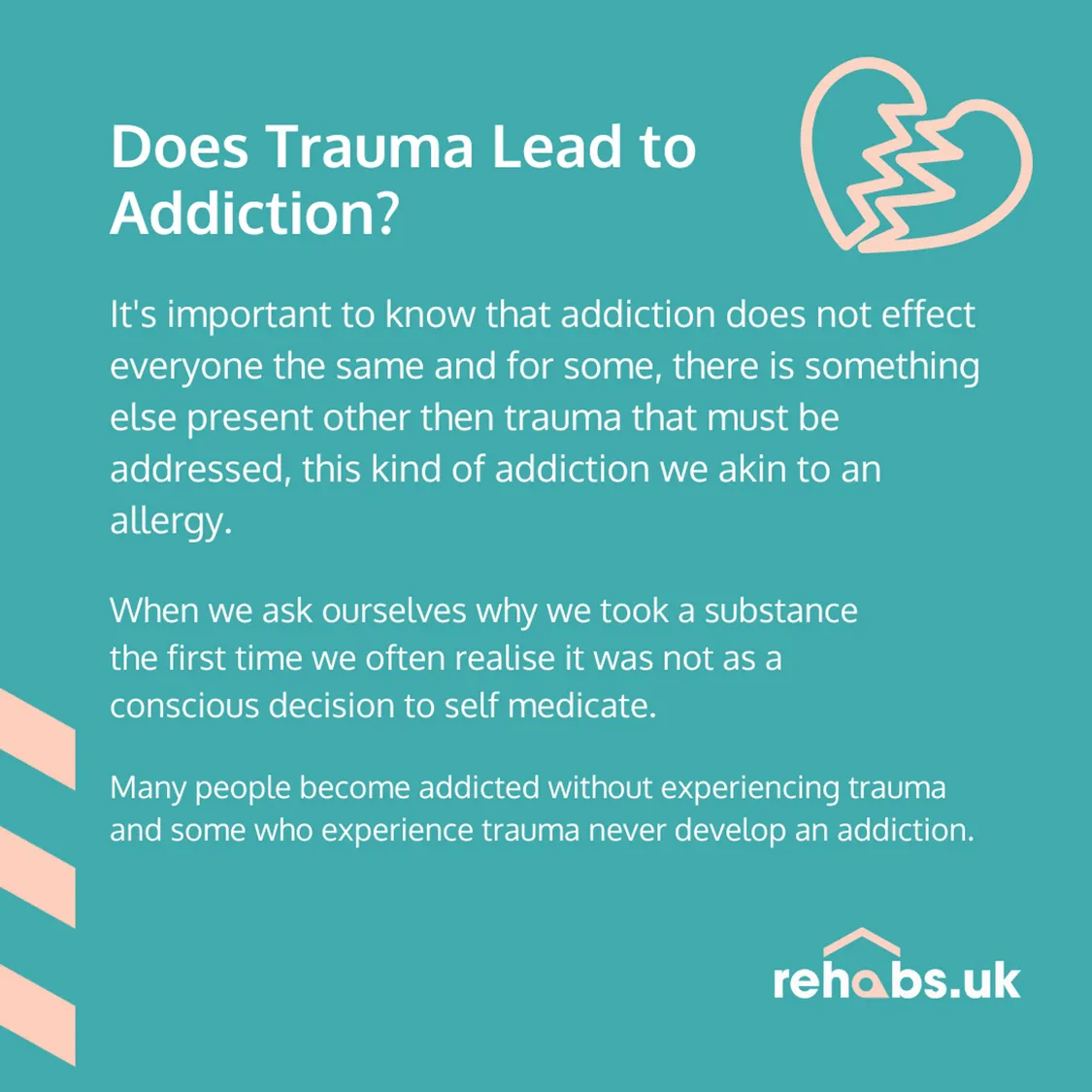09 Feb 2023
The link between trauma and addiction
Trauma and addiction are two interrelated phenomena that can have a significant impact on an individual's life. Many individuals who have experienced trauma, such as abuse, neglect, or a traumatic event, are at an increased risk of developing an addiction. This is because trauma can cause long-lasting emotional and psychological damage, making individuals more susceptible to substance abuse.
Medical and scientific research has demonstrated a strong link between trauma and addiction. Studies have shown a connection between trauma and addiction, stating that 25% of people who have survived traumatic experiences and 40% of PTSD sufferers develop problems with substance addiction. This relationship is due to the way trauma affects an individual's brain and emotional regulation. Trauma can cause changes in brain structure and function, increasing an individual's risk of developing an addiction.
At Rehabs UK, we provide services such as residential rehab which is a protected safe environment for those who need it. Our online and face-to-face therapy is also 100% confidential and a safe space for those dealing with trauma.
Rehabs UK, therapist, Jakana, who struggled with addiction previously in her life said: “it’s a natural defence mechanism…it became an excuse to why I was the way I was… I don’t find that there is always a defined link between trauma and addiction.”
Why does trauma often lead to substance abuse?
Individuals who have experienced trauma may turn to substance abuse as a way to cope with the emotional and psychological distress that trauma can cause. Substance abuse can provide temporary relief from the symptoms of trauma, such as anxiety, depression, and stress, but in the long term, it only serves to worsen these symptoms and increase the risk of developing an addiction.
How does childhood trauma lead to addiction?
Childhood trauma can have a profound and lasting impact on an individual's life. Children who experience trauma, such as abuse, neglect, or exposure to violence, are at an increased risk of developing an addiction in adulthood. This is due to the way childhood trauma affects brain development, leading to changes in the way an individual copes with stress and manages emotions.
As well as this, if a parent hasn’t dealt with their own childhood trauma and they self-medicate with drugs and/or alcohol. This has the potential to cause two problems, one, that it provides an example for the children and two, that the substance addition can also lead to developing abusive behaviours that cause trauma for their own children.
On the other hand, therapist, Jakana, said: “I’ve worked with so many people in my career and a good percentage of them haven’t had anything like that in their environment, respectively quite ‘normal’ upbringings with hard working parents and that doesn’t have a bearing on whether they become addicted or not.”

What other factors can influence an addiction developing?
There are several other factors that can influence the development of an addiction, including:
Poverty
Poverty is a significant factor that can increase an individual's risk of developing an addiction. Individuals living in poverty are more likely to experience stress and trauma, this could be from their living conditions, their education, their family life or their own health which can lead to an increased risk of substance abuse. With the cost-of-living crisis, more and more people everyday are finding it difficult to live and afford basic day-to-day needs such as housing, food, heating etc. which has meant there is a continuing growth of people now living in poverty.
Mental health
Mental health conditions, such as anxiety and depression, can increase the risk of developing an addiction. Substance abuse such as drugs or alcohol or can provide temporary relief from the symptoms of mental health conditions, but it only serves to worsen these symptoms and increase the risk of developing an addiction. If an individual suffers with both mental health conditions and addiction is called a co-occurring disorder or a duel diagnosis. It can be common to have links between depression and alcoholism. It is extremely important to seek help from trained professionals if you or someone you know is struggling with a co-occurring disorder as suicide rates linked to addiction and mental health are common.
Discrimination
Discrimination can lead to an increased risk of developing an addiction. Individuals who experience discrimination, such as racial discrimination, are more likely to experience trauma, which can increase their risk of substance abuse.
Homelessness or Housing Issues
Homelessness or housing issues can increase an individual's risk of developing an addiction. Homeless individuals are more likely to experience trauma, such as exposure to violence or abuse, leading to an increased risk of substance abuse. Homelessness is becoming more of a nationwide issue with the current cost-of-living-crisis.
Domestic abuse
Domestic abuse is a pervasive problem that affects millions of individuals worldwide. The physical, emotional, and psychological trauma caused by domestic abuse can have lasting impacts on an individual's health and well-being, including an increased risk of developing an addiction.
Family history of addiction
Family history of addiction is another factor that can increase an individual's risk of developing an addiction. Individuals with a family history of addiction are more likely to have a genetic predisposition to addiction, making them more susceptible to substance abuse. The family as a whole is also impacted by chronic conditions of high stress and exposure to multiple traumas and families often experience chaotic, disorganised lifestyles, inconsistent and/or conflicted relationships, and crisis-oriented coping.
How to access support for trauma or addiction

If you or someone you know is struggling with trauma or addiction, it is important to access support. Rehabs UK offers a range of useful services to help individuals overcome their addiction and manage the symptoms of trauma. Eye Movement Desensitization and Reprocessing (EMDR) is a form of psychotherapy designed to help individuals process and recover from traumatic memories and distressing experiences. This evidence based approach is endorsed by organisations such as the NHS.
Get in touch with Rehabs UK today to access the support you need to start your journey to recovery.
